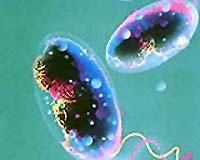| . |  |
. |
Port-Au-Prince (AFP) Nov 15, 2010 Protesters in northern Haiti set fire to a police station and clashed with UN peacekeepers Monday as anger turned to violence in response to a cholera outbreak that has claimed almost 1,000 lives. Doctors and police in the second city of Cap-Haitien said around a dozen people were being treated for bullet wounds, some of them serious, although there was no confirmation from the United Nations that live rounds were fired. "The blue helmets (peacekeepers) fired tear gas, and we know that there were people hurt, but we don't know how they were injured or in what circumstances," UN spokesman Vicenzo Pugliese said. Doctor Yves Jasmin, the top local health official, told AFP around 10 people had been taken to the Justinien hospital, but described the injuries as light. A police source put the number at 14, including two serious wounds. "The situation is very difficult, and there is a lot of violence in the city. I am blocked in the city, and I can't get to the hospital," Jasmin said. Demonstrators set a police station and vehicles inside ablaze as they went on the rampage, accusing the government of leaving the population to die, witnesses said. Protesters also vented anger at the UN peacekeeping force MINUSTAH. The Nepalese contingent that arrived in the country shortly before the outbreak emerged in mid-October is blamed by many for being the source of the epidemic. The UN has promised to investigate claims the outbreak emanated from septic tanks at a camp near the central town Mirebalais where the Nepalese are based, but the World Health Organization has said the source is not important. A second protest on Monday reportedly involved stones being thrown at the UN peacekeeping unit in the central town of Hinche, less than 50 kilometers (30 miles) from Mirebalais. "Some 400 people gathered in front of the UN buildings, but the demonstration has been dispersed without difficulty," Pugliese said. Less than a month after the emergence of Haiti's first cholera outbreak in half a century, the number of confirmed number of fatalities was at 917 and is rising by more than 50 a day. Most deaths have been in central and northern Haiti, with the disease not yet widespread in the capital Port-au-Prince, badly damaged in a January quake which killed 250,000 people and left 1.3 homeless. Officials fear the scale of the epidemic could increase exponentially if cholera infiltrates makeshift camps where hundreds of thousands of earthquake survivors live in cramped and unsanitary conditions. Some 200 of the cholera deaths have been in the north and 100 in Cap-Haitien, public health officials said. Schools in Cap-Haitien are closed as parents are refusing to send children to class, fearing they may get sick. A top UN official said there are now cholera cases in every part of Haiti and aid agencies are expecting a significant increase in the number of infections. "It is an issue of environmental concern, it is an issue obviously of national security where we have demonstrations starting already," said Nigel Fisher, the UN humanitarian coordinator in Haiti. The burgeoning health crisis comes against the backdrop of great political uncertainty in Haiti, where the first post-quake presidential election is due to be held in under two weeks time. "It's clear that on February 7, President (Rene) Preval must leave, so we need to have the election now, on November 28," Mirlande Manigats, a former first lady who has emerged as the front-runner, told AFP. "We are now at the point where we cannot step back because there is a momentum within the population." A second candidate, Leslie Voltaire, said: "We cannot postpone the election because of the cholera. You don't know, if you postpone the election by a month or two, the cholera may be worse than it is today." The elections, which will also see more than 100 lawmakers chosen, were originally scheduled for February 28 but were put on hold due to the January earthquake. Whoever wins will have the mammoth task of rebuilding what was already the poorest country in the western hemisphere -- a Caribbean nation facing vast challenges even to get back to where it was before disaster struck. Problems of corruption, infrastructure and education have now been compounded by the cholera epidemic, which UN health officials are warning has taken root and could see hundreds of thousands of cases in the next few years.
Share This Article With Planet Earth
Related Links Epidemics on Earth - Bird Flu, HIV/AIDS, Ebola
 Haiti cholera death toll soars as election nears
Haiti cholera death toll soars as election nearsPort-Au-Prince (AFP) Nov 15, 2010 Haiti's cholera toll has risen above 900, including dozens of deaths in the teeming capital, as the epidemic showed no sign of abating just two weeks ahead of presidential elections. Health Ministry officials reported Sunday more than 120 new deaths since the previous toll, as authorities and international aid agencies struggled to contain the latest crisis afflicting the desperately poor Ca ... read more |
|
| The content herein, unless otherwise known to be public domain, are Copyright 1995-2010 - SpaceDaily. AFP and UPI Wire Stories are copyright Agence France-Presse and United Press International. ESA Portal Reports are copyright European Space Agency. All NASA sourced material is public domain. Additional copyrights may apply in whole or part to other bona fide parties. Advertising does not imply endorsement,agreement or approval of any opinions, statements or information provided by SpaceDaily on any Web page published or hosted by SpaceDaily. Privacy Statement |